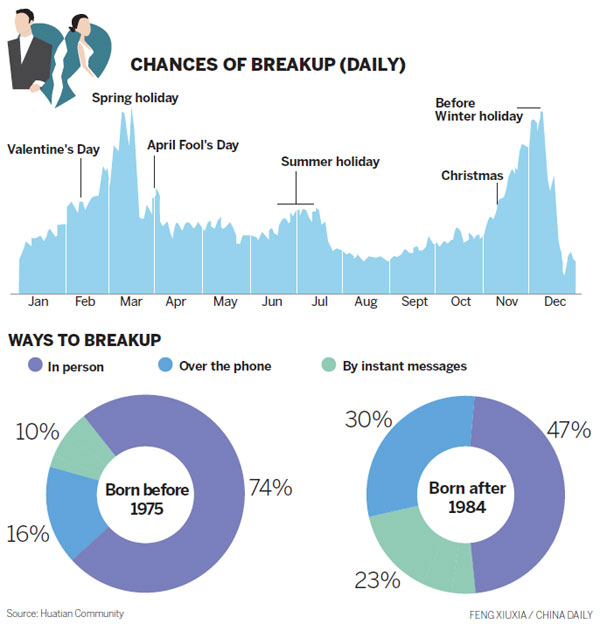Computer love
Updated: 2014-02-20 07:38
By Wang Chenxi, Quan Xiaoshu and Qu Ting (China Daily)
|
|||||||||||
Unlucky in love? Never fear, big data is breaking down the mysteries of romance to help singles find their perfect, mathematical, match. Wang Chenxi, Quan Xiaoshu and Qu Ting of China Features take a look at what happens when one plus one equals two.
In Xiaofei's new home in Shenzhen, Guangdong province, the newly-married engineer hangs on the wall a very special picture - a screenshot of the dialog between him and his wife Aibi in an online game five years ago.
Thanks to the game, Xiaofei, who was then studying in Leipzig, Germany, got to know Aibi, who was then working in China. The two soon fell in love and Xiaofei later decided to go back to China to be with her.
Both Xiaofei and Aibi believe their marriage is a unique miracle. But Xia Tianyu hears stories just like theirs everyday in Huatian Community, an online dating company affiliated with Chinese Internet giant Netease. Xia, the company's general manager, and his 30-member team are trying to demystify love with the help of big data.
"This is a typical case of behavioral analysis leading to accurate demand," he says. In Xiaofei's case, the game provides a dialog channel for people with similar behaviors, such as hobbies, personalities and ways of expression. If man and woman with matching indices happen to be single and seeking love, their online conversation will result in "accurate demand" - dating and everything after that.
Xia, an Oracle expert who is well-versed in database management, believes all things that seem unpredictable and subjective, love for example, can be measured by big data, including "hard indices" like age, height, weight, income and educational background, as well as "soft indices" like language, personality, social preference, reading preference, online duration and even horoscope.
Liu Cixin, one of China's most celebrated sci-fi writers, also believes big data can be quite useful in helping people find their other half. "I once read an article saying that every person on the Earth may, in theory, fall in love with 600,000 others. It sounds amazing, but how many of the 600,000 will the person have the chance to meet in reality? I think there are very few."
"Big data can pick out potential dating pairs from a very large pool, which is more accurate than traditional match-making, and give them chance to meet and communicate," Liu says.
American mathematician Christopher McKinlay famously demonstrated how successful big data can be in the pursuit of love.
McKinlay opened several accounts on the dating site OKCupid, and selected 6 million questionnaire answers from 20,000 registered women. He wrote programs to pick out 5,000 active users and narrowed the pool down by indices suitable for marriage.
Within 90 days, he used his optimized algorithm to find his match, an artist who later became his fiancee.
The concept of big data is new in China, where most online users were born after 1980. This online generation is now at an age where many wish to get married.
Unlike their parents who mainly relied on match-making by relatives, friends and colleagues, nowadays young people, living in big cities with busy lifestyles, have little time to seek partners. Instead they turn to the Internet for help.
Qu Xin, a university lecturer in East China's Anhui province, got her first account on QQ, a Chinese instant message service, in 2000 when she was only 15.
"I began to hear about love affairs on the Internet. The media at the time was very critical of online romance, and my parents didn't allow me to use QQ. But I still chatted online in secret," Qu says.
The 28-year-old has received many flirty messages through QQ. She also has accounts on other Chinese social media, such as micro blog Weibo, and Wechat, a popular mobile messaging application. But none has helped her find Mr Right.
"I often chat with guys online, but most of them are already my friends in real life. If it doesn't work out in real life, it wouldn't work out on the Internet," she says.
Qu has registered on several online dating sites and hopes find a boyfriend through them.
According to China's Department of Civil Affairs, China's single population of marriageable age was 180 million in 2013. Despite the huge number, finding a soul mate has never been easy for young Chinese.
"Love is still beyond the understanding of science," says Ji Xiaohua, CEO and founder of China's popular science website guokr.com.
He says big data can improve the odds in favor of a successful communication. "For example, well-educated young people will find it easier to meet someone in a big city than in small ones, as in big cities there are more people with a similar background. Big data can help to filter out a group of people with similar hobbies and interests on a larger scale, providing a better match than a blind date," Ji explains.
But he also points out the limited role by big data. "So far, the science of biology failed to analyze or understand love. When people fall in love, they make decisions both consciously and subconsciously. Big data can only cover the conscious factors, while the subconscious part is still a mystery for now."
However, Xia Tianyu and his team of engineers are still working on it. The team put together a speed dating event last Valentine's Day. One hundred applicants were selected from 1,000 volunteers and matched by computer during the event.
But before the computer determined the 50 pairs, the would-be lovebirds had already made their own, unscientific choices. Big data matching was challenged, as some participants wanted to choose their dates based on their own criteria, and not follow the mathematical matching spewed out by a computer.
"Machines and technology can't take the place of real-life communication," Xia says. "But I hope one day, it will solve all human mystery, including love."
Contact the writers through features@chinadaily.com.cn.
|
Hu Xuejun / China Daily |

(China Daily 02/20/2014 page18)
Today's Top News
Ukraine president agrees truce with opponents
Beijing opposes Japan’s Taiwan ambitions
China to debut new stealth jet
Country's rich children sent abroad
President Xi made cartoon debut
Probes not target foreign firms
Snowden elected rector at Scottish university
Beijing open for 'equal' dialogues
Hot Topics
Lunar probe , China growth forecasts, Emission rules get tougher, China seen through 'colored lens', International board,
Editor's Picks

|

|

|

|

|

|






